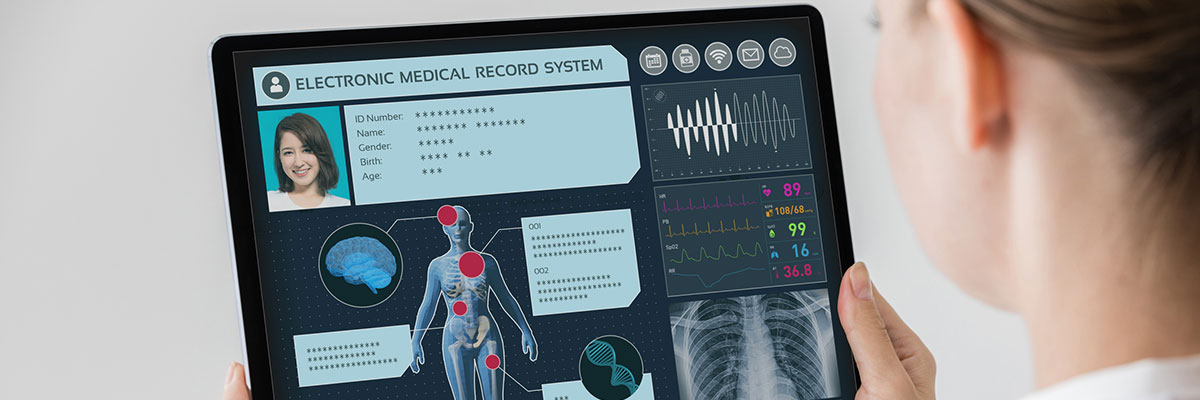What You Need to Know About The Digitization of Healthcare
17 Jan 2019
Technology plays a major role in how Canadians live their lives – professionally and personally. Innovative technologies have changed the way we consume news, the way we communicate, and the ways we experience the world.
Technology has also transformed the way we access and receive health care. From GPS navigation in ambulances to the digitization of medical records and beyond, people can live longer and healthier lives thanks to those who have invested time, money, and energy into improving life quality.

In honour of Canada’s Digital Health Week in November, we collected a few key insights as to how Canada is participating in the move toward the digitization of health services, including how Accerta is pushing for innovation in digital claims processing.
What is digitization?
Digitization (or digitalization) is the process of converting information into a digital format.
What is digital health?
According to Better Health Together, “Digital health enables authorized health care providers to quickly access your health information in order to make informed decisions about your care. Digital health can also enable health care providers to see a patient’s complete record, regardless of how many different care teams a patient is seeing.”
Please visit Canada Health Infoway to learn more about Canada’s digital health plan.
What do patients and medical staff want?
The push toward digitization is not only to improve efficiencies for nurses, doctors, and medical administrative staff, but Canadian patients are increasingly becoming dissatisfied with their care:
-
Only 43% of Canadians were able to see a doctor or nurse on the same or next day when they felt ill
-
Half of those people had to wait two or more hours for care in the emergency room
-
30% of them had to wait two or more months to see a specialist
-
18% had to wait four or more months for elective surgery
Source: Commonwealth Fund
Throughout our research we have identified the following key areas that those seeking vision, dental, and health care treatment and educational resources are struggling with:
-
Increased awareness of online services
-
Ability to receive services online
-
Faster service
-
Easy access to a contact person
-
Improved accessibility
-
Wider variety of service offerings
-
Scheduling appointments
Conveniently, most dental, vision and medical staff want many of the same things, while also asking for access to easier administrative, benefits plan management, and claims processing technologies - to be able to better serve and spend more face time with patients.

The digitization of healthcare could (and should) respond and even resolve many of these issues, through things like:
-
Digital online chat systems
-
Mobile medication refill reminders
-
Wait time notifications
-
Digital medical record organization
-
Online appointment booking
-
Streamlined claims processing algorithms
However, within a system that has been around for centuries, change is bound to be met with resistance. It may not be enough to simply evolve with the times little by little; some argue heathcare is in need of an entire paradigm shift.
“In the face of so many complex factors, it’s not enough to put more money into the system. We must reimagine healthcare entirely – rethinking our processes and aligning them with the real, personalized needs of each patient”.
- Stephan Schindewolf, Digitalist
Paving The Way
While there is still much work to be done, below are a few notable ways Canada is investing in digitization and heathcare technology:
1. Digital Record Keeping
Within a few clicks, most Canadian medical professionals can access a person’s lab results, vision test history, medical reports, dental x-rays, and more. This increases efficiencies for practitioners and reduces the need for patients to repeat themselves and explain their entire medical history to multiple doctors over their lifetime.
However, while digital record keeping can help to streamline the patient experience by cutting down on administrative hold-ups, a question of privacy is valid.
“Gone are the days when individuals tracked changes in their health by simply writing it down.”
– Kristin Bell, Startupbootcamp
As a patient, it is important to remember it is your right to ask how your privacy is protected and how confidential medical records are handled. It is also the responsibility for each organization and clinic to be transparent in disclosing this information, and in maintaining a high level of security that people can trust and rely on.
At Accerta, we do our due diligence to protect and inform our clients by clearly outlining our privacy and security program. We also provide additional resources such as:
“More than 50% of consumers would be willing to share data to improve care coordination, however, 65% of consumers said that data security was more important to them.”
– Liquid State
2. Mobile Health & Telemedicine
With weight loss trackers, health-checker apps, and online medical advice, it would seem that people are spending more time online, and less time at the doctors. And while online medical advice could and can be helpful in cutting down on wait times and improving care for those with limited access to transportation or poor mobility, it is important to remember that self-diagnosis and unsupervised medical care can be risky and unhealthy.

At Accerta, while we value and can appreciate health app technologies, we suggest you always consult a legitimate doctor if you have questions about your health, your diet, or your weight. If looking to online health services, consult a trusted telemedicine platform rather than an unmonitored app or public chat room.
“[In] 2017, 78,000 new health apps were added to app stores increasing the overall offer to 325,000 health apps.”
– Research2Guidance
We would also suggest you investigate and work to understand how the data you’re entering into your mobile apps is protected.
“The digital health market is expected to reach 206 billion U.S. dollars by 2020, driven particularly by the mobile and wireless health market.”
– Statista, 2017
3. Video Conferencing & Record Sharing
Thanks to the digitization of medical records, and thanks to Skype, Google Hangouts, and other video conferencing platforms, doctors, dentists, and opptometrists can now connect with patients and specialists from anywhere in the world – allowing for electronic communication in cases where a patient or medical professional cannot attend a consultation in person.
For example, if you were suffering from a rare condition that had been largely studied in Germany, but you lived here in Canada, your doctors could create a virtual line of communication with specialists from the other side of the world – gathering insights and collaborating on how to best support your health.
4. The Internet of Things (IoT)
If you could connect any object to the Internet, what data would you want to gather? With IoT technologies, medical professionals can gather data surrounding temperature, movement, sound, and more.
From smart glasses to smart bracelets like Fitbit and beyond, almost any object can collect and report on data that may benefit your health.
“57% of patients own a connected care device to monitor various health indicators.”
– Future Health Index

For example, an IoT sensor could be placed on the chairs in a waiting room, to monitor how busy or quiet a walk-in doctors office is at any given time. This data could then be accessible to patients via a mobile app.
The Patient Experience
As identified above, medical service professionals, patients, and caregivers are asking for better, faster, more efficient health care, vision care, and dental care.
However, the question remains: can digitization really improve healthcare service in all areas?
When it comes to the patient experience, is feeding information to a computer more effective than talking to a human being?
We’d argue: that depends.
For example, when it comes to patient medical data, electronic medical records (EMRs) are better streamlined, organized, and more easily accessed through an online portal. EMRs are also arguably more secure, as information is locked behind a passcode, no longer left in a folder on a shelf.

In-person talk therapy, on the other hand, may still be more effective for some than online therapy support in times of crisis or great distress, because feelings of loneliness or isolation may be better addressed with direct human interaction.
For more information, check out this free resource published by Deloitte:
A journey toward smart health: The impact of digitalization on patient experience
The Cost of Digitization
And while all of these technologies have their flaws, there’s no doubt health care is improving. In addition, the benefit of digitization of healthcare isn’t only beneficial for quality of life; it will also save medical professionals, the government, and patients money in the long run – through:
-
Less administration time
-
Increased prevention
-
Early detection

Accerta Claims Management
At Accerta, we’re proud to play an innovative role in providing benefits plan management service that improves the provision of quality healthcare plan management. With fast and easy claims management support, practitioners can spend less time on admin work and more time serving patients, face to face or virtually.
In today’s climate, organizations that do not adapt to emerging technology will be left behind.
Are you ready to digitize your plan benefits management and claims processing?
To learn more about how Accerta is helping to lead the way in Canada’s mission to digitize and improve healthcare, please contact us today.
“Digitalization within health allows us to create new offerings around actual customer needs”
– Dr. Gregor Wiest, Head of Innovation at ERGO Group
